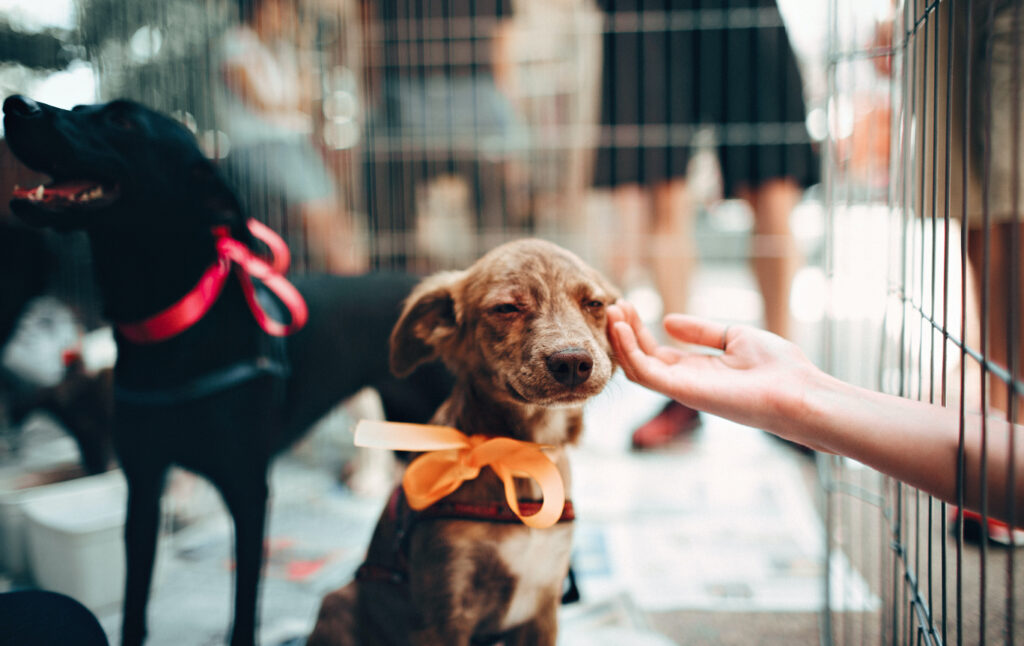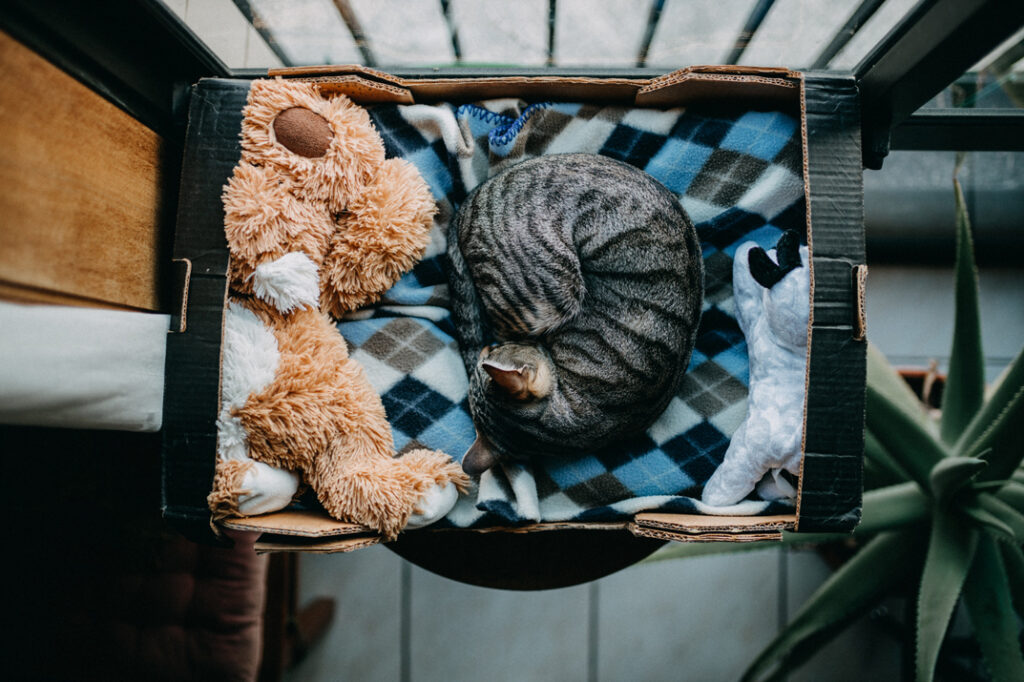
Ah, pets! You gotta love ‘em! Whether they’re fuzzy, feathery, or scaly, having animals makes a home happier. Mine recently became a three-cat household, and there’s always enough drama, excitement, and heartwarming cuteness to make every day an adventure.
If you’re thinking of adding a few paws, claws, or fins to your family, I urge you to consider making your adoption from one of the many local shelters and rescues. Providing a “furever” home for an animal in need will give you warm fuzzies inside and out – because pets are snuggly, and you’re supplying a loving environment to a creature who wouldn’t have one otherwise.
Before you adopt
There’s a lot to consider when choosing a pet. Before you get sucked in by all the adorable faces at your local rescue, assess your lifestyle and needs so you can find the “purrfect” pet for you.
You want to think about stuff like:
Space – your living space, specifically.
- Do you rent or own? Check your leasing agreement to ensure a pet is allowed!
- Do you have room for activities? If you have a 500 square foot bachelor suite, a Great Dane probably isn’t for you.
- What about floor space? They’ll need a bed, bathroom, food, and toys. You’re making room for them in your life emotionally and physically.
Finances
- Have you budgeted for ongoing costs? Your new pet needs food, litter, toys, treats, and regular vaccinations and check-ups even after the initial adoption fees. Make sure you’re OK to set aside some of your monthly scratches to take care of your pet.
- What about emergencies? If Fido swallows a priceless action figure or scarfs down the pan of brownies you left on the counter, you will need to make an emergency trip to the vet! These forays are usually expensive. Whether you stash away a chunk of that monthly pet budget into an emergency fund or have a spare credit card ready to go, make sure to have a plan in place.

Time
- How often are you at home? Whether you’re home all day or gone in 10-hour stretches is a major factor in what kind of pet you should get. Training a new puppy requires constant vigilance, whereas a mature animal is better suited to spend time alone.
- How much time are you prepared to spend with them? All pets need quality time with their owners to establish and maintain a bond, just like any relationship. However, some animals are more independent, and others will hound you for attention. Assess how much time you can allocate to walking, grooming, feeding, playing, training, and petting, and adjust accordingly.
Energy level
- How active are you? Getting up to walk the dog in the morning is a good motivator, but it might also be something you regret committing to. Or, if you want a buddy to go with you on runs, somebody who wants to lie by the fire all day is not for you.
All animals require an investment of time and energy. What varies is how much. Even the most independent of animals need attention and care. So before you scurry off to the pound, take a moment’s “paws” to deliberate.
Adopt On!
Whether you’re looking for a dog, cat, rabbit, guinea pig, or something more exotic, there are many local shelters you could choose to adopt from, such as D’Arcy’s Arc, Winnipeg Pet Rescue, Craig Street Cats, or the Winnipeg Humane Society.

Multiple visits are necessary. Chant this mantra to protect yourself against the impending cuteness. It’s hard not to come home with all the animals.
Shop around – don’t settle on the first pair of adorable eyes you see. When you do find an animal you connect with, you will know. When you find an animal you love, it’s ruff not to take them home immediately. But, a pet shouldn’t be an impulse decision. Many shelters will allow you to put a hold or deposit on the animal you’d like to adopt. Do this and sleep on the decision. If you still feel the same way in the morning, it might be time to take that chance. If you find yourself second-guessing, you may want to re-assess.
Age and personality are much more relevant than an animal’s breed.
Consider adopting an adult animal if you can. A new puppy or kitten is tempting, but they are a lot more work. Mature animals are more likely to be overlooked at shelters, but they’re often much more aware and grateful when they do get taken home. Plus, if they’re already potty trained, that’s a huge bonus!
Get to know them by spending time with them at the shelter and talking with the staff who work with them daily to get a feel for the animal’s personality. Are they adventurous and playful? Social or stand-offish? How do they react to new people or interact with other animals? One isn’t necessarily better than the other, but think about what traits suit you best.
If you’ve decided on your new friend, bully for you! Be sure to get a full rundown of the health and history of the animal before signing the paperwork. Find out what shots they’ve had or still need, and if they’re already spayed or neutered, or if that’s something you need to arrange.
Before you welcome them home, prepare a dedicated space in a separate room of your place so they can be introduced to the rest of the residents slowly.
Homeward Bound!
A safe place is the first thing they need. New environments are scary for anyone! Of course, you’re eager to snuggle and play with your new roommate, but it’s important to remember it can take some time for your pet to adjust to its new home. Some agencies will even send along a blanket or something with a familiar scent that you can add to their setup for a bit of extra comfort.
Establishing a routine is the best thing you can do to settle them in. The more they know what to expect on a day-to-day basis, the more comfortable they’ll be. Try to do things like feeding around the exact times every day. Keep going through the motions of a typical day, and eventually, they’ll begin to fall into it.

Spending quality time with them during this initial settling-in stage is incredibly important. You’re trying to establish a new friend! Make sure to spend time talking to them, playing with them, and even just hanging out with them. If they’re shy or nervous, sitting quietly in the same space and doing something relaxed like reading a book or watching tv can help them get used to you being around.
Treats are a great tool for enforcing good behaviors and easing separation anxiety. A treat when your pup lets you know he needs to pee or when the kitty tries out the designated scratching post will push their behavior in the right direction. And they’re not so worried when you leave if they get snacks when you do!
Have patience! Some animals will take to everything right away, while some may take a few days. My venerable Tiamat hates moving (who doesn’t!?) and will slink around warily for days until she knows every corner has been properly vetted. When we brought our newest one home, he was out galloping around with his new friend within the hour. Some animals may take weeks or even months to adjust fully, so be patient.
If you’re “fur-tunate” enough to welcome an animal into your family, you will have made a “pawsitive” difference in both of your lives. You will always be the person who changed their lives for the better. And it’s such a joy to see them run to welcome you home, playing happily or sleeping comfortably in the sun. By choosing to rescue an animal, you free up space for the shelter to help more animals, and you give that animal a loving home. So hop to it and flock to your nearest rescue or shelter. Everybunny wins!





